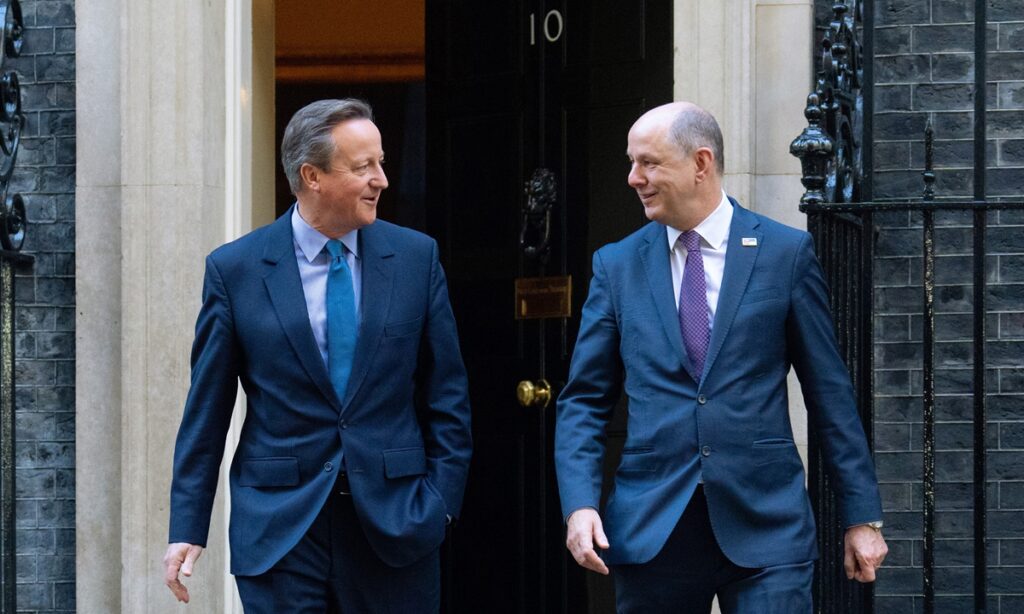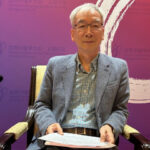In his first public interview to address UK-China relations, the UK’s newly appointed Foreign Secretary David Cameron emphasized the need to engage with China while expressing support for the UK government’s “realistic and hard-headed” China policy.
Chinese experts believe that the former prime minister, often described as the “architect of the golden era of UK-China relations,” is carefully striking a balance between his existing stance toward China, the position of the Sunak administration and different voices within the Conservative Party.
While his remarks, in an interview with the BBC on Saturday, emphasized the need to engage with China, some experts raised doubts on how much the cabinet reshuffle would affect the government’s overall China policy, given its aggressive attitude of the past few years, when it has described China as a long-term threat. Still, some believe that with Cameron coming into office, it might inspire more supportive and friendly voices toward China that would help to reshape a healthy and rational discussion about the UK-China relations in the country.
In the interview with the BBC, Cameron defended his “pro-China policy” as prime minister, insisting that it is still right to “engage” with Beijing, and that China is key to solving big issues like climate change.
While those comments risk angering some Tory MPs, the foreign secretary said he supports the UK government’s current “realistic, hard-headed policy,” claiming that “China has become much more aggressive” around issues like Xinjiang and Hong Kong affairs.
He emphasized that the UK needs to align more carefully with its allies to make sure “we can counter any malign threats coming from China,” explaining why security and protection is an important part of the UK’s policy.
Meanwhile, Cameron defended his previous policy in Downing Street that sought a new “golden era” in China-UK relations, the BBC said. “Engaging China is one part of the approach we need to take.”
“Cameron took into account the demands of all parties involved and came up with a comprehensive and smooth statement concerning UK-China relations,” Gao Jian, an expert on European studies at Shanghai International Studies University, told the Global Times on Sunday.
As for Cameron’s own basic stance, his stance is positive and constructive toward the development of UK-China relations, but he has to take into account the right-wing Conservative Party forces that have been obstructing the policy toward China, Gao noted. “To avoid exacerbating political contradictions, he must discuss UK-China relations in a comprehensive way.”
Some media reported that Sunak may seek to involve Cameron more widely in domestic and electoral politics as a symbol of the moderate, centrist tendency within the Conservative Party.
Cameron, who served as British prime minister from 2010 to 2016 and resigned after the Brexit vote, made the “surprise comeback” on November 13, replacing James Cleverly, who became home secretary after Sunak sacked divisive incumbent Suella Braverman.
The Chinese Foreign Ministry congratulated Cameron on his appointment, calling on the two sides to work together to promote the healthy and stable development of China-UK relations.
“Cameron’s current position is fundamentally different from when he served as PM when he had complete autonomy over decision-making regarding the UK’s foreign policy direction. Now he must certainly align with Sunak’s overall foreign policy directives,” Li Guanjie, a research fellow from the Shanghai Academy of Global Governance and Area Studies, under the Shanghai International Studies University, told the Global Times on Sunday.
In fact, the UK’s policy toward China encompasses both confrontation and cooperation, Li said, noting that as Cameron came into office, he might emphasize the aspect of cooperation with China while de-emphasizing the confrontational aspects. “But he has to safeguard the authority of the Sunak administration by properly handling different positions.”
Although it is still too early to tell if his appointment will reverse the aggressive position of the UK’s China policy and make changes to the UK-China relations, Li said that he believes it may inspire some positive and friendly voices inside the UK, especially when confrontation and containment toward China has become common in the UK’s China policy.




